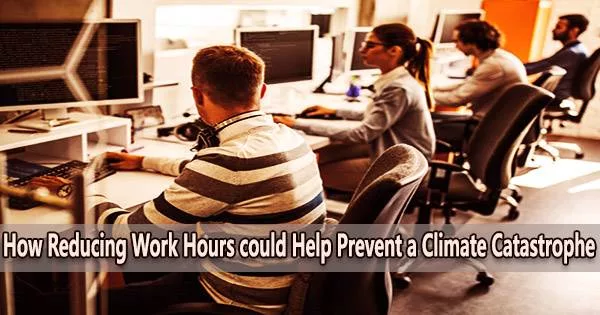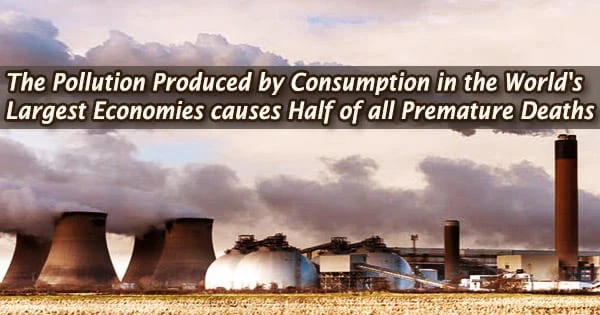A developing trend toward a “degrowth” economy involves working fewer hours and creating less material goods in order to lower humanity’s carbon impact.
Many people are prepared to adjust their work-life balance in favor of life, as seen by the Great Resignation and four-day work week trials that have taken place around the world. This movement, which purports to be about health and wellbeing, may also be able to help with the most urgent issue of our time, climate change.
Focusing on wellbeing rather than riches may actually be our best chance of preventing the most disastrous effects of climate change, claims a sustainability expert from UNSW Sydney.
“The pandemic showed us that it is possible for a lot of people working in offices to do so from home while having little, if any, impact on the quality or quantity of their work,” says Professor Tommy Wiedmann, who is with UNSW Engineering.
“Apart from the obvious reduction in greenhouse gases coming from commuting, there are many other changes we can make to the way we work that can significantly reduce our carbon footprint.”
Workplaces should switch entirely to sustainable energy while reducing energy use, reducing waste, conserving water, and implementing sustainable procurement policies that take ownership of the carbon footprint created by the manufacture of products needed by the workplace, even if those products were produced in another country. Progressive corporations and institutions, like UNSW, have already adopted some of these sensible ideas.
But according to Prof. Wiedmann and a growing number of climate change and sustainability experts, these measures alone will barely make a dent on rising temperatures without a rethink of what work is and how much of it is required for a comfortable, yet sustainable lifestyle.
Reimagining work in this way is a component of a bigger movement to change a society that depends on fossil fuels into one with zero carbon emissions. To get there, they argue, we need to embrace the idea of “managed degrowth.”
The neoclassical economic model doesn’t know any limits. It’s a very simple model that says the larger the economy gets, the more there is for everyone. But it doesn’t observe that there is a biophysical limit that is a limited Earth and that the human population and its consumption cannot grow forever.
Professor Tommy Wiedmann
What is managed degrowth, and how can it help?
Most of us have gotten used to thinking that “growth is good” after years of watching and reading the daily news. We now know that it’s linked to a lot of jobs, a lot of goods being produced and consumed, and active participation in global trade.
According to sustainability experts, the issue with unending growth is that it presupposes an endless supply of resources, an endless landfill for waste, and an endless supply of riches and happiness.
Yet, it is obvious that this is not the case; the earth and its resources are limited, and so-called planetary boundaries have long been violated in order to maintain safe levels of important Earth system functions. Neither does endless growth make us endlessly happier. On the contrary, rising inequality puts strains on societal and individual well-being.
Managed degrowth, on the other hand, is a deliberate, controlled shrinkage of developed economies…but without the panic normally associated with negative gross domestic product (GDP).
Prof. Wiedmann says failing to see how the relentless pursuit of growth hinders sustainability is a blind spot among economists, politicians and corporations who haven’t yet twigged to the idea that simply adding renewable energy without changing business practices will not solve the problem of temperature rises.
“The neoclassical economic model doesn’t know any limits,”” says Prof. Wiedmann. “It’s a very simple model that says the larger the economy gets, the more there is for everyone. But it doesn’t observe that there is a biophysical limit that is a limited Earth and that the human population and its consumption cannot grow forever.”
He says the idea of degrowth is like kryptonite to most politicians who are wedded to the idea that economic growth means the creation of jobs and welfare.
“And that’s true, when you start at a low level. For most developing countries, a growing economy increases social welfare and a society’s well-being.”
“But for developed countries, that has leveled off for decades now. We keep on growing, but we’re not any happier, or we might even go down in terms of personal well-being. When you have crossed that point, which is in the region of US$20,000 a year of income per person, you don’t create more well-being.”
Down with work
Could it be that if we’re overconsuming, then we must be overproducing? And if we’re overproducing, are we overworking?
This question may have already been answered by the Great Resignation trend brought on by the COVID-19 epidemic, stagnating earnings, high cost of living, and low job satisfaction. It begs another: what would a streamlined work week look like that allows workers to work less and increase their well-being?
Many since Marx have tried to answer this question. Austrian philosopher André Gorz suggested in a 1988 paper that work could be reduced to a four-day, six hour-day workweek. A 2010 paper by the New Economics Foundation proposed a 21-hour workweek while economist John Maynard Keynes in the 1930s foresaw we would be working as little as 15 hours a week.
Recently companies like Unilever have trialed a four-day work week in Australia and New Zealand, while a movement called 4 Day Week Global has prompted a six-month trial of the model in the U.K. across 70 companies.
The trials came without lower remuneration, which presented an issue for sustainability even though it was determined to be successful. A fair wage downscaling is also necessary to reduce overconsumption.
“Otherwise nothing will change,” says Prof. Wiedmann.
Changes need to come from all levels of society
This is why Prof. Wiedmann reckons ideally we shouldn’t have to rely upon individual corporations to lead the way in scaling back work output and tackling overconsumption. A more efficient strategy to arrive sooner might be through community activities and targeted policies at various levels of government.
Sustainability expert and UNSW colleague, Honorary Associate Professor Mark Diesendorf researches in ecological economics and says there are a number of ways this could be achieved including:
- Cutting back work hours or shortening the work week.
- Job sharing involves splitting up one task among several people so that each person works less hours.
- A Job Guarantee, for everyone who wants to work, funded by the federal government.
- Universal Basic Services, where the government provides more resources for public health, education, transport and housing.
- Increasing work-life balance by permitting remote work, more flexible working hours, and paid parental leave.
- Reducing consumerism by encouraging a culture of collaboration and sharing, putting a focus on local values, and giving social ties more importance than material things.
- Legislation encouraging design of products for reuse, recycling and remanufacture.
- Rich people’s consumption, which has the most significant environmental effects, should be discouraged through wealth and inheritance taxes.
- Non-coercive policies to end population growth, especially in high-income, high-consumption countries.
“Why would the vast majority of people support these policies?” Assoc. Prof. Diesendorf asks.”
“Because they would benefit in the substantial increases in government spending on poverty reduction, green infrastructure, health-care, public education and public transport as part of a shift to Universal Basic Services. They would also have a shorter working week to share the work around, as well as a job guarantee at the basic wage for all adults who want to work and who can’t find a job in the formal economy. And when they’re older, a substantial increase in pensions.”
Prof. Wiedmann agrees.
“Some of these policies are trialed in countries that promote a ‘Well-being Economy.’ A universal basic income would take away the pressure for people to have to work to generate an income just to keep their heads above water,” Prof. Wiedmann says.
But managed degrowth doesn’t necessarily mean going back to a time of greater hardships, he adds.
“The way I think about it is how did we live in the 1960s? Houses were smaller, there was one television per household, one toilet, one car.”
“And if you compare that to today, everything is two or three times bigger. Now many of us have got two or three cars, two or three houses, two or three bathrooms, TVs in multiple rooms. But we are certainly not at a higher level of happiness.”
“Transitioning to a degrowth doesn’t need to be painful. But the alternative continuing down our current path where we leave it up to individuals and corporations to make work and lifestyle changes to limit temperature rises will be catastrophic.”
















